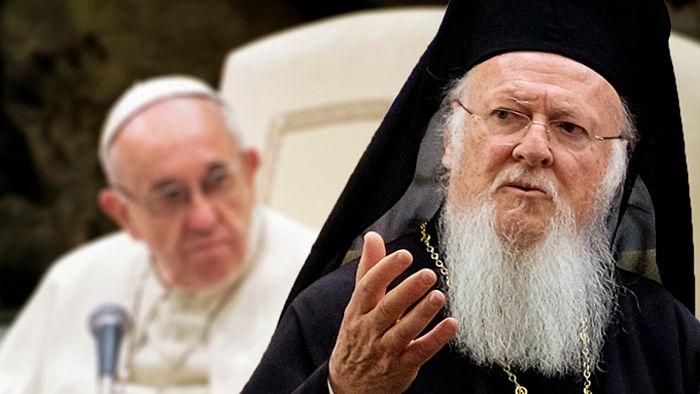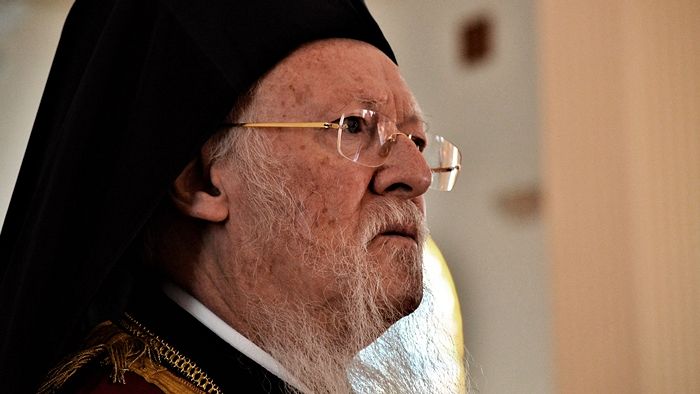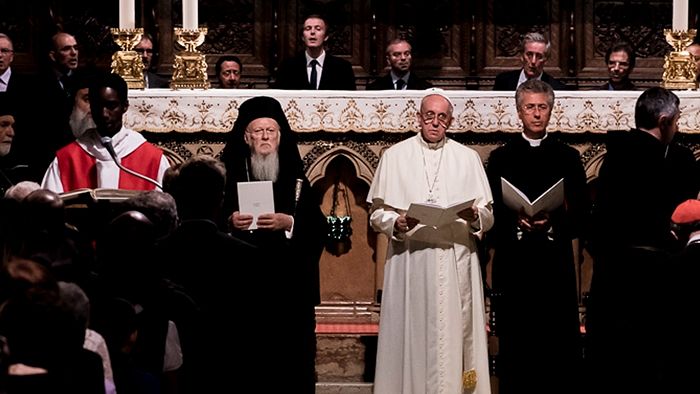THE PATRIARCHATE OF CONSTANTINOPLE NEEDS TO ADMIT ITS REAL STATUS IN THE ORTHODOX WORLD
Translators note: The original Russian version of this interview was published before the severing of Eucharistic communion between the Moscow Patriarchate and the Patriarchate of Constantinople, which occurred due to Constantinople anti-canonically invading the canonical territory of the Ukrainian Orthodox Church-Moscow Patriarchate. As a result, the conversation reflects events prior to that.
This is an interview with one of the most beloved and famous clerics of our times, the Mitered Archpriest Andrei Tkachev, considered among the greatest orators and homilists in the Russian Church. Born in Lviv, Western Ukraine, a place strong in Ukrainian nationalism, Father Andrei later served in one of the most popular churches in Kiev, and is therefore very knowledgeable about the situation in Ukraine.
While the traditional Orthodox view is like St. Lavrenty of Chernigov said, that Russians, Ukrainians, and Belarusians are one people, in Ukraine today, any idea of spiritual unity between Russians and Ukrainians can sadly bring death threats from extremists. Simply serving as a canonical priest can cause this. Bearing this in mind, Fr. Andrei now continues his priestly ministry in Moscow. Due to his deep understanding of the Ukrainian reality, we provide this translation, even if the interview took place before the complete cessation of Eucharistic communion with the Ecumenical Patriarchate, as many great points were made below.
* * *
 Photo: www.globallookpress.com
Photo: www.globallookpress.comSince the end of last week, the commemoration of Patriarch Bartholomew was suspended at all Divine services within the Moscow Patriarchate. Furthermore, concelebration with hierarchs of the Patriarchate of Constantinople, as well as the participation of representatives of the Russian Church in any entities headed by representatives of the Phanar (a tiny district of Istanbul where the residence of the Patriarchs of Constantinople is located) has also been suspended.
The possible perspectives of this situation, both in Ukraine and at the pan-Orthodox level, have already been analyzed at the website of the TV Channel “Tsargrad”. Today, we bring to your attention a perspective on this issue from a famous Orthodox pastor and homilist, the host of the daily program “Svyataya Pravda” published on our channel; and cleric of the Church of St. Basil the Great near the Moscow village of Zaitsevo, Archpriest Andrei Tkachev
—Fr. Andrei, for many years you served in Ukraine, and therefore the problem of Ukrainian autocephaly devised to destroy the unity of the Russian Church is well known to you, and you have spoken about this many times on your program “Svyataya Pravda.” But now I’d like to touch more broadly on this issue: What can prompt the synodal decision to suspend relations with Patriarch Bartholomew? And why, despite his anti-canonical actions, is it just a suspension, and not a severing?
 Photo: www.globallookpress.com
Photo: www.globallookpress.com—Yes, I think that what is happening concerns the entire Orthodox world, so we need to wait for a reaction not only from the Patriarchate of Constantinople. And at the time, I see a very right and proper gradualism1 in this matter.
This is because if you act in the spirit of the Middle Ages, then the response would have been mutual curses, anathemas and all. At that time, everyone irrefutably2 believed in one’s own status as a keeper of truth. But as we have learned from history, such hardline steps don’t bring benefit in the long-term perspective. This therefore is why today we need gradualism.
But at the same time, we need to narrow down the situation in the Orthodox world to the real, actual position of the Cathedra of Constantinople amidst the Local Churches. They to this moment live in a historical illusion, a beautiful memory of the times of great antiquity – before the fall of Constantinople. Of course, there is no longer any kind of “procedural oversight,” or function of a “highest arbitration” throughout the entire Orthodox world, and there does not need to be.
Yes, in the bygone years, the rights of Constantinople as the capital city of the Roman Empire (Byzantium) gave the Patriarchate of Constantinople certain privileges in relation to other Eastern Churches. And yes, in the tenth century, we received the faith from Constantinople; however, it’s long since been made up for by our own historical responsibility for the entire Orthodox world; we fought for the Bulgarians and Serbs, we for centuries quite literally fed the Eastern Churches, including Constantinople. That is to say, we fully repaid them for that great mission.
—And what can we, the Russian Church, expect from that same Patriarch Bartholomew, as well as from the primates of other Local Churches, at the reception of this decision?
—We certainly can’t help but expect a change from them. But change without purpose comes only from demons. Of course, people vested in the hierarchical dignity can be externally influenced, they are under the influence of various, and at the same time, often multidirectional forces.
Nevertheless, each of them has the fear of God, and accountability for their flocks, and God’s grace is active on their living souls. Moreover, many Local Churches have the same complaints about their schismatics as the Russian Church does.[3]
And now, if the Patriarchate of Constantinople appropriates case law,[4] creating a precedent of “supreme arbitration”, thereby giving what they want to whom they want, this means that Orthodox ecclesiology (the theological-canonical doctrine concerning the Church and her borders—Ed.) would be thrown out, and an repeat of the papacy would appear.
—This means that the Patriarchate of Constantinople will fall into the Roman Catholic Latin heresy, against which it once fought. In general, does it seem to you that in recent centuries, the Phanar has steadily moved away from Orthodoxy?
—Yes, such a trend is visible. Moreover, in the history of recent centuries, being under the Turks, Constantinople rushed either to papal extremes, or to the extremes of Protestantism, who fought with Papism. There were quite a few patriarchs who left so many questions open with regards to their dogmatic purity of thoughts. And in newer Church history, the calendar schism was provoked by the Phanar, and they supported the Soviet Renovationists.[5]
 Photo: www.globallookpress.com
Photo: www.globallookpress.comAt the same time in Constantinople, in Istanbul itself in the 1920s and 30s, there was a real “leapfrog” of patriarchs, and in this “leapfrog”, in this dubious gallery of various personalities, we suddenly hear a polyphony of sorts, a sort of hymn in honor of contrived privileges, in honor of this made-up “primacy”, as “a primacy of power”. Moreover, if you call to remembrance the holy Patriarchs of Constantinople who are revered in the Russian Orthodox Church (and there are many of them), then none of them spoke from such authoritarian positions.
Certainly this is an apostasy phenomenon (apostasy meaning departure from Christian truths.—Ed.). And the fact that [the Phanar] recently decided to allow priests to marry twice is approaching this as well. And at the same time, they are constantly doing something unilaterally – they abolish something, they accept something else, and they are trying to slam this down on the entire church, at the same time, suddenly declaring their pretentions.
These citizens of Turkey, sitting on a small patch of land under the dominion of a sultanate, or the secular Turkish state, having practically their entire flock across the ocean, adopted a very strange opinion of themselves. And personally, the incoherence of this is striking to me.
The question is: Where is there room for Christ in all this self-importance?
—Nevertheless, the “legates” of these “Eastern Popes”, the “Exarchs” of Constantinople from the semi-schismatic “UOC of the USA”, and the “UOC in Canada”, have already arrived in Kiev and stated that the process of Ukrainian autocephaly is “on a straight line heading for the finish line”[6] What can this lead to? Does part of our canonical Ukrainian Orthodox Church falter?
—A part will falter. There has long been a part stumbling there in a low place. And of course, this [decision of Constantinople] will bring no peace. But the fact is that all schisms are like cisterns, like sewer drain basins—they tend to collect all the ecclesiastical dirt – all the Judases, the deposed, the twice-married, fornicators, and perverts.[7] And these “exarchs” will gather around them this same cistern. And they will be the owners of garbage dumps.
—And will the canonical Ukrainian Church remain standing?
—She will remain strong, she will be established and cleansed, and she will sign forth as a confessional Church. The best qualities of the Ukrainian Church will be manifested in its confessors, patiently keeping the faith. And it will be simple, because two “vacuum trucks”[8] have arrived. They, while themselves not knowing it, will not gather anyone except those who are already a “floating fraction”.
11/27/2018
1 This idea is quite characteristic of the general Moscow Patriarchate response. When asked how the Moscow Patriarchate may “retaliate”, Metropolitan Hilarion, Chairmen of the Department for External Church Relations said “At each stage we will give to those who are still our partners an opportunity to change their mind and reconsider their decisions.” [Source] Compare this with the gradualism Father Andrei is speaking about. It must be said with the utmost objectivity that the Russian church (including the Ukrainian Church) has only acted with the spirit of brotherhood and gradualism, not desiring to trigger a conflict. The severing of eucharistic communion with Constantinople should not be incorrectly seen as simple retaliation but was rather the unavoidable condition and reaction created by Constantinople’s anti-canonical actions. When Constantinople recognized schismatics who not only serve with heterodox Uniates, but condone bloodshed, and paint murals in churches glorifying war and Nazism, and seize canonical Churches with violence, it became impossible to remain in communion with Constantinople. By Constantinople taking into themselves these dangerous violent schismatics, communion with them became impossible, because it would entail communion with the schismatics by proxy. —Trans.
2 Father Andrei used the word безапелляционно, which literally means unappealable i.e. something, typically a ruling or decision which cannot be appealed, especially by a court or arbiter. This is interesting, because one of the many highly debated and contested aspects of the alleged “Eastern Papism” of the Patriarchate of Constantinople, is their apparent conviction that they are the final “court of appeals”, within Orthodoxy, which can review and change the status and rulings of other Local Churches.—Trans.
3 One of the most significant examples is the non-canonical “Macedonian Orthodox Church”, which was arbitrarily separated from the Serbian. Another example is the schismatic Montenegrin faction described here.—Trans.
4 The Russian phrased means literally “precedential law” i.e. [canon] laws based on established legal precedent, the practice and common norms of legal dispensation, as opposed to strictly based.
5 See also here: http://orthochristian.com/117222.html
6 http://orthochristian.com/115834.html
7 Both St. Lavrenty of Chernigov and Metropolitan Onufry also noted how the schism will gather and purge the church of all the worst elements.—Trans.
8 Fr. Andrei is referring to the two exarchs of the Constantinople Patriarchate who came to Ukraine in September 2018 to start gathering all these schismatics into a proposed unified “Chur


No hay comentarios:
Publicar un comentario